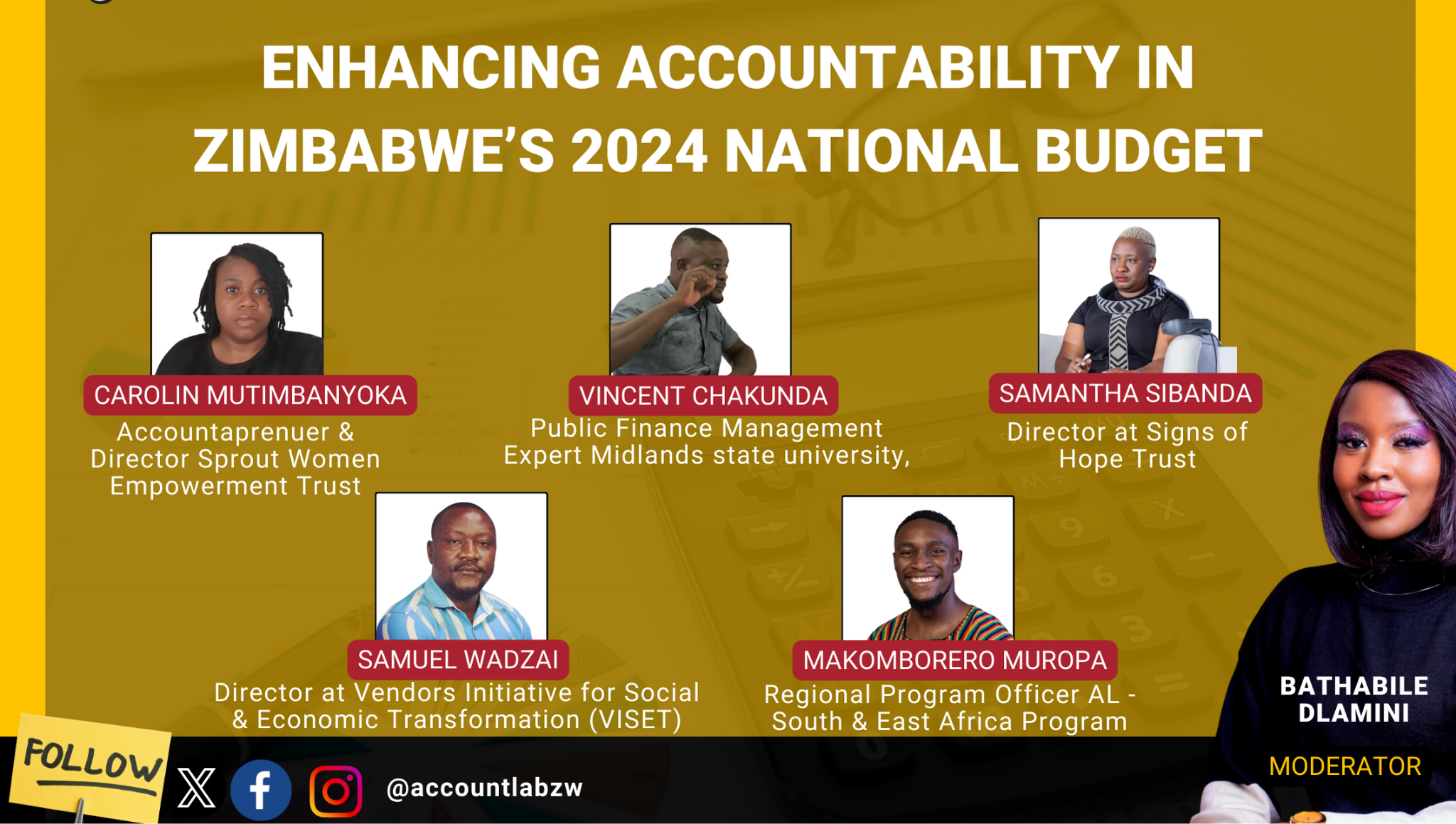NEWS

IN BRIEF
Zimbabwe’s National Budget Cycle is a crucial tool for promoting […]
SHARE
Zimbabwe’s National Budget Cycle is a crucial tool for promoting transparency, accountability, and fiscal clarity, as outlined in the Public Finance Management Act.
“The Minister of Finance has the responsibility of ensuring that the national budget process adheres to accountability standards, says Makomborero Muropa, Regional Program Officer Accountability Lab South and East Africa Program.
Muropa said this during a recent Accountability Lab Zimbabwe (ALZ) X-Space discussing the need for citizen participation and accountability in Zimbabwe’s 2024 National Budget processes. The discussion emphasized the importance of tax impact assessments, raising questions about opaque tax systems, Zimbabwe’s high tax burden, and the exclusive nature of the budget cycle.
The discussion follows widespread public outcry regarding the terms of the 2024 National Budget Proposal, delivered in a speech by Mthuli Ncube, Minister of Finance, Economic Development and Investment Promotion. The Budget proposal, themed “Consolidating Economic Transformation” included various restrictions on informal traders in the procurement of locally manufactured goods, an increase in passport fees, and the implementation of a wealth tax on residential properties above a certain value.
A panel of experts familiar with past national budget processes and their implications contested the accountability of the 2023 process, calling for tax impact assessments in the upcoming budget cycle, which begins in April 2024. The budget cycle consists of three main phases: pre-budget, budget execution, and post-budget.
During the pre-budget phase, the Minister presents the budget strategy paper to Parliament, which provides an overview of the previous year’s performance and projections for the upcoming financial year.
“Unfortunately, public knowledge and access to the budget strategy paper are low, despite its importance in setting the tone for the budget,” says Vincent Chakunda, public Finance Management Expert Midlands State University. This lack of public literacy on budgeting and public finance management results in limited public participation in pre-budget consultations.
Samantha Sibanda, Director at Signs of Hope Trust. Raised the problem of inclusivity in the budgeting process. She highlighted the limited accessibility of the process for People With Disabilities (PWD), particularly the deaf population, who are unable to participate due to lack of affordable gadgets and restricted access to information platforms. Sibanda pointed out the clear lack of accountability and exclusion resulting from taxation of assistive technologies for people with disabilities, despite the high economic cost of disability in Zimbabwe.
“A lot of people with disabilities can’t even afford the gadgets,”says Sibanda. She added: “They can’t afford radios. Most of the people with disabilities are also based in the rural areas, in fact, the whole population in Zimbabwe most of us are in the rural areas. So, it means that this process was not inclusive.”
The speakers questioned whether the concerns of the general public are considered when formulating the country’s budgets and taxation.
Oswald Mudzingwa, an economic analyst at the parliamentary budget office of Zimbabwe, confirmed that “input from public consultation and outcries are taken into account during the budget formulation process”. He added: “ The revision of budget proposals on wealth tax, passport fees, and toll increases in response to public outcry are evidence of public influence.”
The informal sector, which represents a significant portion of Zimbabwe’s economy, is disproportionately affected by tax increases.
“Taxing the informal economy requires comprehensive data, transparent tax systems, and political will,” says Samuel Wadzai, Director at Vendors Initiative for Social and Economic Transformation (VISET). “However,” he added, “corruption and unfair practices have hindered the growth of the sector and led to the emergence of unauthorized revenue collectors known as “space barons.”
For greater accountability in the national budget process, experts recommend intentional community engagement, targeted outreach efforts, and inclusive allocation and disbursement of funds. The issue of devolution funds also needs to be addressed to ensure compliance with constitutional requirements.
However, for greater accountability in the national budget process, Sheryl Chigwedere, a Program Officer Sprout Women Empowerment Trust, recommend intentional community engagement, targeted outreach efforts and inclusive allocation and disbursement of funds.
—
Bathabile Dlamini is the Media and Communications Officer at Accountability Lab Zimbabwe
